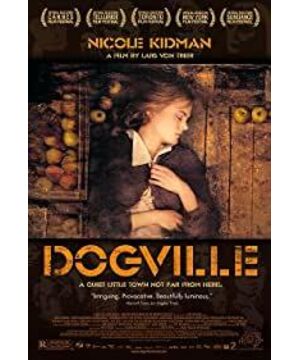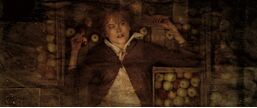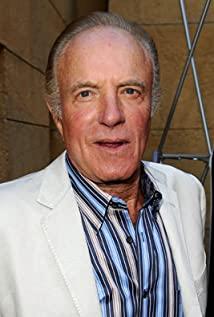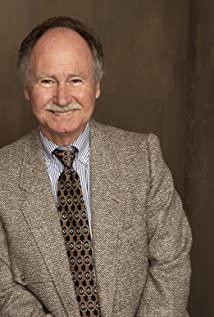Does compassion benefit the world in the end? After watching Dog Town, the most direct question in my mind is this. Talk about the plot earlier.
The entire film is presented in the form of a stage play. There are only squares divided by white paint on the entire stage to distinguish whether it is a street or a house. Everything is flat, except for people and furniture, cars and meetings. used chair. The food is flat, the dog is flat, the stage is so big, and there is nothing outside the stage. Dog town, isolated from the world.
Mr. Writer finds Grace in distress when he hears gunshots the night before his lecture on saving the souls of his countrymen. His assurances and Grace's efforts made Dogtown accept her and promise to keep her secret. But the police's repeated visits make Dogtown residents feel more guilty about not being able to report them -- even if they know the police's remarks are about framing Grace. They increased Grace's hours and lowered her salary, and Grace made frequent mistakes in the daily high-intensity work. The orchard owner threatened Grace with a report after she refused to kiss her while he was picking apples. On another police visit he raped Grace in his home. This is where the root of sin begins.
Since then, the orchard owner has become more and more excessive, and he has been violent to him again and again in the orchard. He is seen by a woman in the town. The woman told the orchard owner's wife. The wife learned from her husband that it was Grace who was courting him, so she came to Grace. At home, punish him.
She said, "Then I'll be more merciful and smash you two little china figures first. If you are calm and don't cry, I will stop."
Grace burst into tears, and she smashed the little china figures one by one. The sound of thunder.
The Little Porcelain Man was pointed out to Grace by the writers when she first came to Dogtown. She bought a lot of small porcelain figures with her wages, the last two were bought by the writer, and she finally collected all the small porcelain figures. Little Porcelain is her warmest connection with Dogtown, which proves that everything she has done here, and everyone she has helped, is of value. Dogtown, shrouded in the light of the Little Porcelain, is Grace's Garden of Eden, a symbol of her dreams. Dreams were smashed one by one, because of trumped-up charges, she was leaving.
After careful planning, Grace gets into the trucker's apple car and prepares to leave Dogtown to meet the writer she loves "again in freedom and light." She was illuminated inside the truck with sackcloth, and gradually the sackcloth became vaguely transparent. There was only Grace and the ripe apples in the wooden box. She opened and closed her eyes, and every move was hope. Yes, hope. To me, an outsider, she finally escaped from this seemingly harmonious dog town full of hypocrisy and sin, which I think is the most hopeful scene in the entire film.
But the director's next shot is really cruel. Perhaps the last shot was not so full of hope, but under the background of this shot, it definitely symbolizes the longing for infinite freedom, infinite beauty and happiness. The truck driver climbed into the car and rubbed against Grace's side, using flattering words just to explain that he was going to sleep with Grace, and threatening her with plain language. The picture is not unsightly, the filming is very obscure, there is no ill-clothing, and Grace's silence is almost not enough to say "rape", but this is more shocking than any rape scene I've seen. . There was no panic or pain in Grace's eyes, not even despair, just an empty shell. No matter how her body was abused, she was powerless and unwilling to fight—since the porcelain man was smashed as a child, the hazy outer skin of Gouzhen countryside was ripped off, leaving only a bloody dirty heart. Grace has lost her dream Eden, so how can she care about her physical pain? She has deeper and heavier pain!
After seeing this scene, my mentality is probably also inclined towards Grace. I don't think there's anything more cruel than this, hoping to fall into the abyss after only three seconds. This kind of mentality made me see that the driver still drove back to Dogtown. The residents of Dogtown designed a dog leash for Grace, with a bell at the neck to prevent her from escaping. In the plot of the moving iron wheel, he just closed his eyes and vomited in despair - despair is saturated. If the director wants to expose human nature, he is too successful.
The person who designed the dog leash was a stupid engineer who was encouraged by Grace time and time again, and told Grace that it was not the father of the highly respected author, a doctor, who told Grace that it was not punishment. After the orchard's wife knew that Grace was forced by her husband instead of actively seeking love, she just ignored her husband, but she was even more demanding to Grace. Men went to her room every night to snatch her up, "like a lust on a cow". The children play with her, and the whole dog town gets a plaything, a plaything that is so beautiful that it won't resist, the ownership belongs to them! The residents left the goodness and sincerity of human nature to their neighbors, and vented all their sins on Grace. There was no catastrophe in Dogtown, but the handle of a beautiful woman in distress fell into their hands. The viciousness of human nature In this way, there is no reservation, and it is completely exposed to the blue sky! Isn't this just like "a breeze" in "Rashomon" that evokes all sins? What is civilization? What is the restriction? In front of their neighbors, they are still well-dressed and gentlemen, and they are hard-working people who still strive to survive under difficult conditions, but they show their natural fangs to the fragile Grace in the dark. Ugly to look at.
It seems that only Mr. Writer, who loves her, is not corrupted by humanity. When Grace was still respected, Mr. Writer said to her, "Lise is very understanding, so I only have carnal desires for her. But I can't understand you." Grace replied with a smile, "You want to Say, do you love me?" The writer turned to him, and Grace smiled softly, saying, "That's a coincidence, I seem to be in love with you, too." The
writer suggested Grace to state some of her experiences at the village meeting , without personal prejudice, just an objective and calm statement. Although Grace thought it was inappropriate, she also agreed. After her objective and calm statement, the villagers sneered, "She's lying." "She spread rumors, and she deserves death." Everyone has an absolute tacit understanding. Lace, without exception. The weak-hearted Mr. writer received a deep blow. When the villagers pressed him on which side he was on, he only said, "I didn't expect that the neighbors I knew since I was a child would never reflect, but just defended blindly." And gone.
But the writer's move didn't impress me very much. Maybe his behavior has been swaying, and there are writers who regard themselves as the supreme moral code, so his words are always a bit stupid. It may also be that the previous plot is too desperate, and I only have a pessimistic view of Mr. Writer. He came to Grace's house and told Grace that he had abandoned everyone else for her. He longed for solace in Grace, such as carnal lust, as he did for Lisa. Grace rejected him, expressing that she only wanted them to unite in freedom and light, and that she would never resist if he threatened to rape her. Grace asked him, "Are you afraid that you still have humanity?"
Mr. Writer said, "No, of course not." But
he felt that Grace was too cruel and too smart to see through the evil in his heart at a glance. Feeling that his moral standing is threatened, he takes out the business card given to him by the underworld boss and decides to report Grace.
It's just an understatement like this, but it's just a conversation between Grace and Mr. Writer, as well as a few strands of thought when Mr. Writer came to the moonlight with a frown. The good was completely swallowed, and the evil was clearly visible under the pale moon. Flowing clouds and flowing water, with a light stroke, the blade slashed through the heart, and the blood flowed into a river that was hard to detect. I expected no one to be clean in Dogtown, but I didn't want anyone to be so dirty.
On the second day, everyone was friendly to Grace. They said that Grace's speech yesterday was very good, and they have all been self-reflection. For a week, Dogtown was peaceful and quiet. But the anxiety and waiting under the tranquility will never be ignored by the sensitive Grace. "Dogtown has never been a place to hold back anger." She already knew the mob boss was coming, and the residents' disguises were sarcastic.
The mob boss is here. After the first two hours and forty-five minutes of depression, pain, and torture, this three-hour film finally returns to the light of day. The mob boss is Grace's father, and he gets angry when Grace says he's arrogant, which leads to the first episode of chasing and killing his daughter. The father wants his daughter to come back, but the daughter still does not agree with the father's murderous behavior.
My father said, "You say I'm arrogant, that makes me so angry. You're the most arrogant one. You think your morals are high, so you forgive those people, you don't think they live up to your moral standards, so It can be forgiven. But if you did what they did, you would never forgive yourself. This is your greatest arrogance!"
"Dogs just obey their nature, why punish them for their nature?
" It's wrong, but I can't forgive it again and again."
Grace recalled everything Dogtown had done to her, raped, teased, abused, cheated, betrayed.
"It shouldn't punish them. If I were born in Dogtown, I would probably be like them."
"I would never forgive myself for doing what they did."
"I just want the world to be a better place."
"The world would be better without this town.
When I heard this, the agony of the previous two hours and forty-five minutes blew away. In the end, Grace asked the younger brothers to kill everyone, and said, "There is a family with Child, kill the child first and let the mother watch. Tell her that if she can stop crying, you will stop. "This is what I owe her. "
There was only one Mr. Writer left, and Grace got out of the car with a gun. Mr. Writer, still dying, said it was such a wonderful experiment in witnessing human nature that he wanted to say what he could do at the last minute of his life. All evil for humanity. Grace held the gun with tears in her eyes, "Goodbye. "
It was only through Grace's tears that I realized that this was not an evil cycle of abusers turning into abusers. The phrase "the world would be better without this village" is not the beginning of violence, but a crime Grace is really a soul noble to heaven. She has been wronged in Dog Town, raped by men, ordered by women, and looked down upon by women, but she refuses to escape or return to her father. Only because of her faith and perfection! She has suffered all the evils of human nature, and she still refuses to give up her compassion and arrogance. It is like the Lord Jesus was nailed to the cross for the sins of mankind. Maybe she feels that the evil of mankind Oneself, can be good and beautiful at other times.
This idea of the Virgin may be absurd and terrible in the eyes of most people, but in my opinion it is holy and inviolable. Perhaps it was because of the influence of her father's murder without blinking an eye that she wanted to influence the world with love and compassion, so that they would no longer do evil, or perhaps it was an idealism that was born out of lack of practicality, but even so - able to suffer so much Is it not the great blessing of mankind to have love and forgiveness later, not to be the next perpetrator, and to have good thoughts? Just like Eugenie of old Grandet, her loyalty and kindness cannot save the world, but her actions are a warning to the world - the goodness of people can compete with the evil in desire. Grace is compassion, arrogance, and supreme goodness.
Of course, the best is the idea, but making the world a better place is the goal. "If I did what they did to me, I would never forgive myself." Grace let go of her arrogance, but not her mercy. She has seen the deepest and most painful viciousness in human nature, but she is still not afraid of human nature. Her killing is for a better tomorrow. The residents of Dogtown are guilty of their own crimes. Just like people who have killed people, they are excited about blood. The pale moonlight stripped them of their hypocrisy, and they could never look back. Since it is irreversible, it is better to eradicate it than to harm the world.
At the end of the film, the dog barks. Grace got out of the car and saw Moses, the watchdog, barking. The entourage wanted to kill the dog, but Grace stopped him, "It's just mad at me for stealing its bones." It was Grace who was hungry when she first came to Dogtown and took Moses' bones. "Don't worry about it, Georgetown will see the fire here, and someone will take it down." The flat Moses turned into a real dog, barking at the camera, just because Grace took its bones, and the film ended.
It's ironic, isn't it. Dogs are angry at you for taking their food, angry at you for hurting it, but people are angry at you for their own sins, and completely hurt at you for their own mistakes—because you are beautiful , pure, flawless, noble! The sins are reported to be warm, but the best is isolated. Who is more noble, a human being or an inhuman dog?
Irony aside, there is still hope. Grace is that hope—killing is indiscriminate, good and bad, and Grace's shooting is redemption. The shot she fired at Mr. Writer could not have been more desperate. Any previous scenes of Grace being tortured, including being raped in a heap of apples, didn't have this shot of desperation (of course, I also corrected the previous saying that leaving Dogtown was full of hope, after all, for Grace, leaving Dogtown was a good idea. An escape, she is a disappointment rather than a hope.). This is not what you and I see, the sympathy for poor Grace and the anger at the brutality of the inhabitants of Dogtown, but the desperation that belongs to Grace alone - the Eden in her heart no longer exists, not in her father's gang , not even in Dogtown. That shot was relieved, and she finally accepted that the ugliness of human nature could not be saved by mercy, even with a feeling of despair and pain. She is determined to make efforts to make the world a better place, and punishment is necessary, but it is compassion in the name of punishment!
Based on this understanding, I have a little understanding of why the director should use the stage play method to make the movie. The end of the stage is blank, and Dogtown is isolated but the most authentic part of the world. In addition, what cannot be ignored in the film is his narration-a pleasant, calm, sober voice, accompanied by melodious classical music, telling this story of despair and hope.
The narrator is probably God, watching his perfect angel, how to redeem human beings and redeem himself in the world.
MoonlightBaby
View more about Dogville reviews











